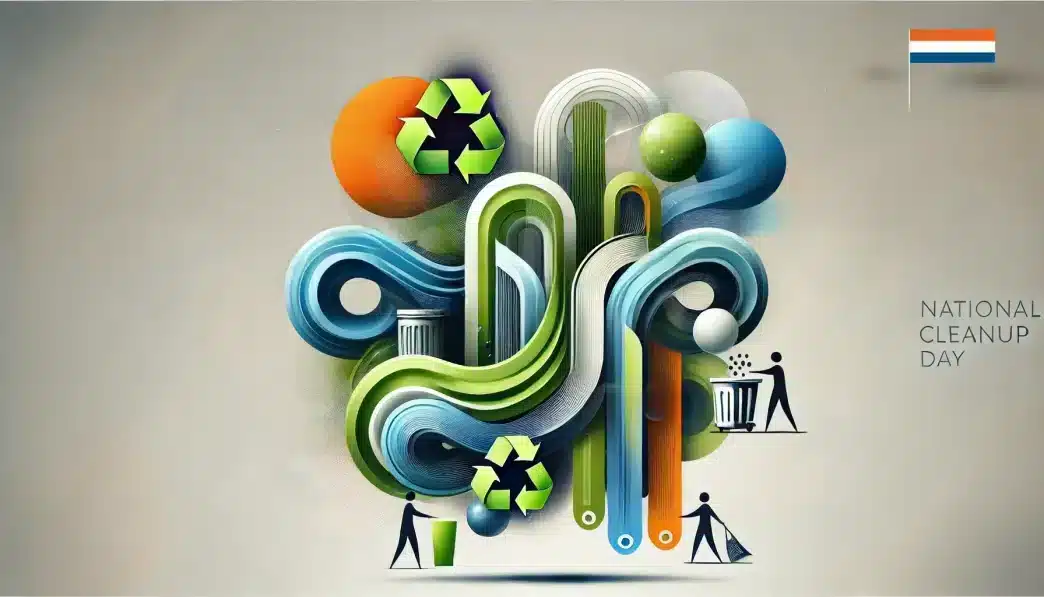What is National Cleanup Day?
National Cleanup Day, known in the Netherlands as Landelijke Opschoondag, is celebrated annually on the fourth Saturday of March. It encourages individuals, communities, and organizations across the country to join forces in cleaning up local streets, parks, and natural areas. The day promotes environmental awareness and a shared responsibility for keeping neighborhoods clean and sustainable.
This nationwide initiative not only addresses litter but also fosters community spirit and highlights the importance of protecting the environment for future generations.
History and Origin
Landelijke Opschoondag was launched in 2002 by Nederland Schoon, a foundation dedicated to reducing litter and promoting cleanliness across the Netherlands. The initiative was introduced to raise awareness about the harmful effects of litter and to encourage collaborative action in addressing the issue.
Over the years, this cleanup day has grown significantly, involving schools, businesses, local governments, and environmental groups. It has become a symbol of collective action, inspiring both immediate and long-term efforts to create a cleaner and greener environment.
Who Celebrates National Cleanup Day?
- Residents and Families: Local citizens participate by organizing or joining cleanup activities in their neighborhoods.
- Schools and Universities: Educational institutions involve students in litter-picking projects to teach them about environmental responsibility.
- Businesses and Corporations: Companies engage employees in cleanup efforts as part of their corporate social responsibility programs.
- Local Authorities: Municipalities provide resources such as trash bags, gloves, and waste collection services to support the initiative.
- Environmental Organizations: Nonprofits and advocacy groups lead large-scale cleanups and run awareness campaigns.
Slogans and Themes
The themes of Landelijke Opschoondag revolve around collaboration and sustainability. The event highlights the power of community in addressing environmental issues with messages such as “Together for a Cleaner Netherlands” and “Every Small Action Counts.”
The aim is to inspire behavior change, not only on this specific day but as a year-round commitment to reducing waste and taking care of the environment.
Colors, Symbols, and Patterns
Colors
- Green: Represents nature, sustainability, and a clean environment.
- Blue: Symbolizes clean waterways and the goal of reducing waste in aquatic ecosystems.
- Orange: Reflects energy, participation, and the Netherlands’ national identity.
Symbols
- Trash Bags and Litter Grabbers: Represent the tools used in cleanup efforts.
- Tree Icon: Symbolizes nature and the connection between cleanliness and environmental health.
- Recycling Symbol: Highlights the importance of waste reduction and sustainability.
Patterns
- Circular Motifs: Reflect community collaboration and the cycle of sustainability.
- Wave Patterns: Represent the effort to keep waterways free from litter.
- Leaf Designs: Symbolize the natural beauty that cleanup efforts help to preserve.
How to Celebrate National Cleanup Day
- Join a Local Cleanup Event: Participate in a cleanup drive organized in your community or city.
- Organize Your Own Cleanup: Gather friends, family, or colleagues to clean a local park, street, or natural area.
- Teach Sustainability: Use the day to educate children or peers about reducing waste and protecting the environment.
- Adopt Eco-Friendly Habits: Commit to using reusable bags, bottles, and containers to reduce litter.
- Share on Social Media: Post photos and stories about your cleanup efforts using the hashtag #NationalCleanupDay or #LandelijkeOpschoondag.
Most Used Hashtags
- #LandelijkeOpschoondag
- #NationalCleanupDay
- #CleanUpNL
- #SustainableLiving
- #TogetherForClean
Why is National Cleanup Day Important?
National Cleanup Day is important because it addresses the critical issue of litter and its impact on the environment. It encourages individuals and groups to take action, fostering a sense of responsibility and pride in their communities. By promoting collective efforts, it demonstrates how small actions can create significant positive change.
Moreover, this day serves as a catalyst for long-term environmental awareness, inspiring people to adopt sustainable practices and make cleanliness a priority in their daily lives.
Features
Contact Info
Fourth Saturday of March: Cleanup Day (Netherlands)
Why do you keep falling for the same type?
Read the article Lovemaps: the hidden blueprint of our love.

